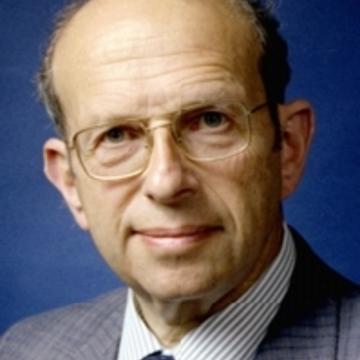Prof Sir Peter Hirsch: 1925-2025

Sadly, Professor Sir Peter Hirsch died on Friday 12 September 2025. Affectionately known in the department as 'PBH', he was a defining member of Materials Science both here in Oxford and across the globe for his work in transmission electron microscopy, studying defects in crystals, and modelling mechanical properties of crystalline materials in terms of dislocation processes. In particular, he pioneered the use of transmission electron microscopy in Materials Science with the first direct images of dislocations in crystals. In 1965, with Howie, Whelan, Pashley and Nicholson, he published the text Electron microscopy of thin crystals, known as the 'yellow bible' for many of us. He was also recognised internally for his ability to lead, inspire and organise, and for recognising talent in young scientists who, through his mentoring and encouragement, would go on to become internationally significant in their own fields.
It is fair to comment that PBH loved his research, so much so that members of the department used to jokingly refer to the 'Hirsch principle' (a paper is never finished - only abandoned). Professor Steve Roberts reminisced in his speech, during the January 2025 centenary celebrations for Sir Peter, that even when he was on holiday he was still mentally in the lab: "I'm ringing from a call box so my wife won't find out. Now, how is that experiment going on?". Even during retirement, he would delight in coming into the department and working with students and colleagues. When asked by the department during the lockdowns if he could give a bit of background information to some people featured in the very first departmental photograph, he exceeded our hopes by providing an excellent summary of the department as it was in the late 1950s and early 1960s. At the age of 95 he recalled the names of his DPhil students from 1966-1967 and expressed pride in how the department has always been a safe environment for people, no matter what is happening in world politics and the international mix of people - as PBH wrote in 2020 'the University environment and common scientific interests overcame any political differences'.
In 2001 the department began hosting the biennial 'Hirsch Lectures' in honour of PBH, who attended as many of them as possible in person. During the last few years he was unable to make it into the lecture theatres, but still logged-on from home, and always contacted the organisers afterwards with his thanks. 2026 will see the first Hirsch Lecture without his great presence, either in-person or online.
PBH was a modest man, but the facts speak on his behalf: he was Head of Department here for 26 years, he was also the Isaac Wolfson Chair succeeding our founder, Professor William Hume-Rothery, he served as Chair for the UK Atomic Energy Authority, was the founding Chair of Isis Innovation (now Oxford University Innovation), and was awarded his knighthood in 1975. In 1963 Sir Peter was elected as a Fellow of the Royal Society, and among many other honours he was awarded the 1983 Wolf Foundation Prize in Physics. He was a Fellow of St Edmund Hall, Oxford and an Honorary Fellow of the Royal Microscopical Society.
Three years ago, sponsored by the Royal Microscopical Society, PBH delivered an international online seminar about his early work, which can be accessed through YouTube ('Royal Microscopical Society: Interview with Professor Sir Peter Hirsch HonFRMS FRS'). He also gave a talk to the Oxford University Chabat Society on his and his family's experiences before and during World War II. You can watch it in full online: 'A Family Scattered: A Family's Experience in the Holocaust'. From that boy who witnessed the Kristallnacht first hand, and sat on a Kindertransport train, which ominously stopped during its journey, Sir Peter went on to live a long and rewarding life. He was a devoted and loving husband, stepfather, grandfather and great-grandfather. To those who knew him in a professional capacity he was an astounding intellect, and a thoroughly kind, decent, humorous and generous friend and colleague.


